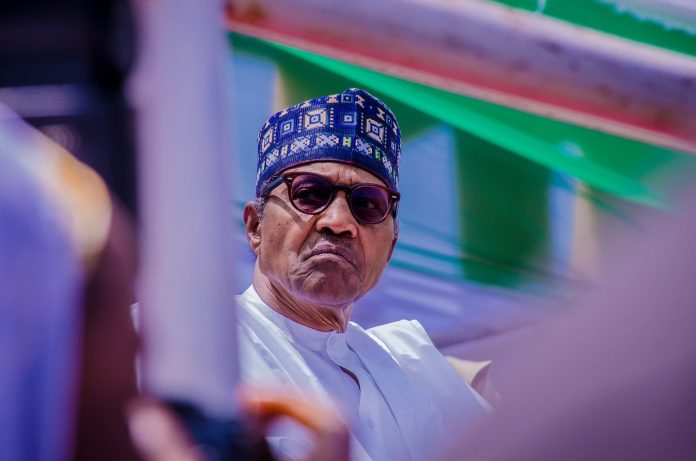I hazard a guess here that former President Muhammadu Buhari needed no one tell him that fellow Nigerians would judge him by the core promises he made to secure their votes in 2015.
He knew they would ask no one in particular if he left a robust national economy, a nation largely rid of bands of criminals calling the shots and cheapening the lives of fellow citizens and a nation not defined in purple prose as corrupt.
Now, they are asking if his eight years in office justified the hope they invested in his capacity to solve the three core problems crippling the nation and its development.
The general knew these problems had held Nigeria back from rising to its full height in its social and economic development. He knew the nation had been down on its knees praying for the emergence of the man with the courage and the determination to rid the nation of them. He knew that whoever takes the burden off the back of the nation would be a celebrated national hero. Buhari repeatedly presented himself as the man the country needed.
He began with the careful construction of his persona that the nation believed approximated that of the hero they needed. His constructed persona rested on the vital pillars of honesty, incorruptibility, and broad-minded nationalism.
He weaponized silence. He avoided participating in national controversies, discourses and debates on issues that bothered the nation. On the annulment of the June 12, 1993, presidential election, not a word. On resource control, mum.
On the agitation for the restructuring of the federation to cure it of its glaring defects and remove the military detritus that has turned it into a mix of federalism and a unitary system burdened with the military command system, his leaps were sealed. He could not be challenged on anything because he offered no opinions on anything.
It came as a huge surprise, therefore, when he decided to mine June 12 by conferring the highest national honour of GCFR, given only to presidents and heads of state on the presumed winner of the election, the late Chief Moshood Abiola. He followed it up by declaring June 12 democracy day. But he could not articulate the importance of the day and what it means or should mean in our national politics.
He contested the presidential election three times and won the fourth time. He presented himself as a man on a rescue mission. Col Abubakar Dangiwa Umar, one of the most principled officers the Nigerian Army has produced so far, said that when Buhari decided to retire from politics in 2014, he was persuaded not to abandon a nation believed by his miners to be in a lurch.
According to Umar, Buhari allowed himself to be persuaded with the argument that abandoning his national rescue mission was no option. In a recent newspaper interview Umar said the argument was: “Who was more qualified to tackle the growing insecurity than a retired general, a civil war veteran and a former head of state? The general had a record of being a warrior against corruption, a leader of much vaunted integrity.”
At his campaigns for president in 2014-2015, he was packaged as the face the people could identify with. His minders decked him out in the traditional wear of each geo-political zone. It was intended to serve as an important message about his identification with all tribes and all parts of Nigeria. I could imagine his discomfort in the Ndigbo costume with a royal fan in his hand.
At his inauguration as president in 2015, he mined this packaging with this statement: “I belong to everybody, and I belong to nobody.”
In office, he gave a lie to belonging to nobody. He showed he belonged to somebody. As Umar put it: “Buhari’s high level of nepotism ensured that appointments, particularly in the sensitive area of security were skewed in favour of his section of the country, leading to unprecedented polarisation, discontent and separatist agitations.”
The careful construction of Buhari’s myth and persona as the man most qualified to take on our national challenges preceded his assumption of office as president on May 29, 2015. The myth began to grow before, during and after his overthrow 20 months after he overthrew President Shehu Shagari. The myth created a larger-than-life image of him as a competent manager of human and national resources, nationalistic, honest, incorruptible, and a modest man who shunned wealth and conspicuous living.
But the Buhari who emerged from Aso Rock after two terms as president seems to bear little resemblance to the myth and the persona. As the facts of his performance as president roll in waves of shock and surprise, the myth and the persona are rapidly unravelling, leaving the hollow feeling of disappointment in the pith of the nation’s stomach.
When he overthrew President Shehu Shagari late 1983, Buhari told the nation that “the change became necessary in order to put an end to the serious economic predicament … now afflicting our nation.” His coup announcer, Brigadier Sani Abacha, said Shagari had hopelessly mismanaged the economy.
Buhari must have verily believed that President Goodluck Jonathan too, took the economy down the Shagari path. After all, he said Jonathan had no capacity for anything.
It is time for the former president to sit back and, if he can, digest the verdict of history as president. What did he make of his promises to the nation? Did he leave a sound national economy? Did he wrestle down corruption? Did the nation become safer from bands of criminals?
He has responded to these and other questions to underline the fact that he made promises and he delivered on them. He probably took the advice of the late premier of Northern Region, Sir Ahmadu Bello, Sardauna Sokoto, who said that people should blow their own trumpets because others are busy blowing theirs to spare time for them.
Buhari blew his own trumpet to prevent other people’s trumpets from drowning out his own. In his own generous assessment of his performances, he lived up to the expectation of Nigerians – and much more. He believes – and his minders agree with him – that he was the best thing to happen to the country. Buhari scored himself immodestly high, as indeed, most men in his position who refuse to notice the holes in the Teflon would.
He told Bloomberg in an interview in June 2022: “We leave Nigeria in a far better place than we found it. Corruption is less hidden for Nigerians feel empowered to report it without fear, while money is returned; terrorists no longer hold any territory in Nigeria, and their leaders are deceased; and vast infrastructure development sets the country on course for sustainable and equitable growth.” The interview was unedited.
If you fact-check the president’s claim, it will wilt beside the facts as we now know them. Abubakar Umar told his own interviewer: “No matter how insulated he was from our reality, he could not have failed to realise the level of devastation he caused Nigeria in the eight years of his administration. His strange and self-serving claim and that of his minders and sycophants that he left Nigeria better than he met it in 2015 amounts to pure delusion.”
Perhaps, we must begin the assessment of his claims from the beginning by looking at what he made of his core promises to the nation. First, the economy. The myth about his competent management of the economy unravelled within one year of his taking over from Jonathan.
Under the latter, the economy was not “hopelessly mismanaged.” It was reasonably healthy. It was reasonably well-managed. Buhari did not inherit an economy in want of a physician from his predecessor. The national debt was a reasonable N15 billion.
Buhari’s economic management skill deserves some sympathy because the economy was not kind to him. It sabotaged his myth as the best economic manager the nation was lucky to have. The economy tanked within one year of Buhari’s minding the national treasury. In 2016 and 2018, the economy delivered bad news when it went into recession – a wrenching period for national economies. Two recessions were records for the Buhari administration.
Year 2017 brought more bad news on the economic front. Nigeria was formally declared the poverty capital of the world. It took the unwanted crown from India.
When Buhari assumed office, 80 million Nigerians were poor. He promised to take 100 million people out of poverty in ten years. He had eight years to work the magic. It should work out at 10 million per year for a total of 80 million in eight years. It did not happen. By the time he left office last year, poverty and extreme poverty had sunk 158 million Nigerians below the minimum survival level.
By 2019, Buhari began to desperately cast around for a lifebuoy to save the economy under his watch. This led him down the path of his model of economic management, to wit, external jumbo loans. It was a simplistic approach to the complex problem of economic management. His economic model was a disaster for the national economy.
Former President Olusegun Obasanjo said, “I knew Buhari didn’t understand economics but (I) didn’t know he was so reckless.”
By the time Buhari left office last year, the debt burden had reached a crushing N77 trillion. So much for the mythical best economic manager Nigeria ever had.
To be concluded



